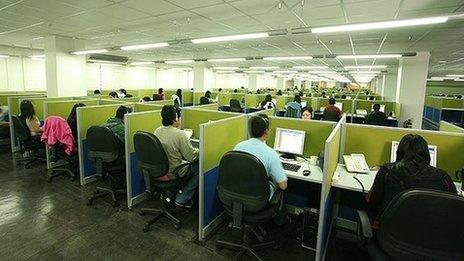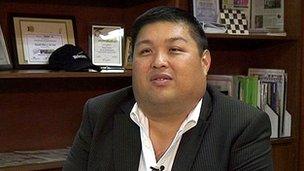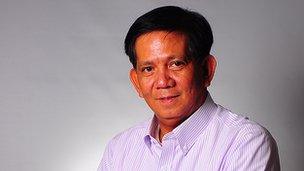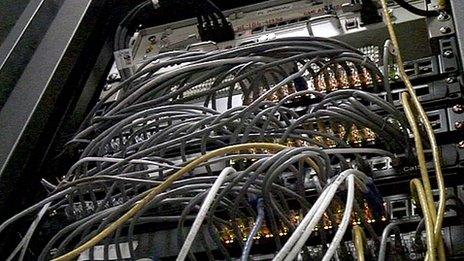Call me: Tech powers Philippines call centre success
- Published
When night falls in Manila, a wave of young people scurry into the skyscrapers which criss-cross the city.
They're call centre agents, and because most of their clients are on the other side of the world, the night shift is their busiest time.
Last year, with more than 600,000 call centre workers, the Philippines officially overtook India as the world's call centre capital.
If you phone up to book a flight, buy a theatre ticket or complain that water is cascading out of your washing machine, you're now more likely to speak to a Filipino than an Indian.
The Philippines has a number of obvious advantages when it comes to call centres. Wages are low and most Filipinos speak English in an accent which, given the American colonial influence here, is easy for US customers to understand.

The growth of call centres in the Philippines followed the advent of internet telephony - which meant overseas calls were no longer prohibitively expensive
Filipinos also pride themselves on being approachable and friendly - a trait which is essential for speaking to strangers on the phone every day.
But a good phone manner is no longer enough.
The industry is changing fast - and despite being in a country where more than a quarter of the population live in poverty, call centre managers know that, to be competitive, they have to invest in technology to rival that found anywhere in the world.
"The Philippines came into this business about 10 years ago, around the time of a technological shift to IP telephony," says Raffy David, one of the directors of Teleserv, a call centre that caters for both Philippine and overseas clients.
IP telephony - or voice services over the internet (like Skype) - suddenly enabled companies to make easy and cheap foreign calls, opening up the possibility of outsourcing call centres in the way that had never been economically viable before.
"We got the new equipment, and had an attitude to embrace new things," he says. "We still have that."

Teleserv's Raffy David says low labour costs mean the company can invest in technology
A decade later, labour costs remain low (a Teleserv agent currently earns about $4,800 a year) and Mr David says that a substantial proportion of the money this saves goes into investing in new techniques for improved customer service.
"It's all about enhancing the customer's experience," he says. "We want to give them a fast, efficient and highly personalised service."
Multiple channels
Teleserv's staff now do far more than answer phone calls.
They're getting an increasing number of queries via email, and the company has developed a system which filters emails so that common topics are grouped together, allowing the agent to write one answer to multiple queries.
Another growth area is social media.
"More and more people are wanting to contact us by Facebook and Twitter," says Raffy David. "We have to be able to respond to that need."
One of the firm's latest innovations is a system that groups all social media into one folder, allowing employees to instantly see every message, no matter how it comes into the centre.
In order to stay ahead of the game, Teleserv sometimes employs outside firms like Avaya, which specialise in providing communications solutions.

Avaya's Edgar Doctolero says social media means customer service has to be good
"Especially now, with so many people using social media, businesses have to be very careful that their service is good," says Edgar Doctolero, the country manager for Avaya Philippines.
"It's so easy for people to post opinions - either good or bad - on Facebook or Twitter, and their message can go viral really quickly.
"Imagine the impact that can have on a contact centre."
One system Avaya is currently promoting is Click To Chat, to help customers while they're browsing a web page - perhaps there's an instruction they don't understand, or they don't know how to navigate to the relevant section.
Using Click To Chat, the customer can simply type their query into a box, click a button and receive an agent's reply.
Mr Doctolero says his firm is also developing more video-based products than it did in the past.
"We have a client that's a printer company - and the majority of calls they get are about how to replace a particular cartridge," he says. "We realised this and made a video of how to do it, so when a customer contacts us with this type of query, we can just send them the video."
All change
But it's not just ways of interacting with customers that are changing. The very nature of call centres themselves is also undergoing a dramatic shift.

For the Philippines to expand into the business process outsourcing business, investment in technology must continue
Many people here are anxious to differentiate between call centres and BPOs (Business Process Outsourcing).
A BPO is much more than a call centre - it includes human resources, finance, accounting, even paralegal work - and many industry insiders say this is where the future lies.
You only have to look at the example of India, they say, which is way ahead of the Philippines in this regard.
The Philippines may have more call centre agents, but India still has more BPO employees - and every year a great proportion of them work in the more lucrative and more skilled non-voice-based services.
Looking at the returns, it's easy to see why the Philippines wants to follow India down this route. In 2010, India's overall BPO revenue was $70bn, compared to just $9bn in the Philippines.
A move away from voice-based services will need more staff, more training and more hardware.
But Jojo Uligan, head of the Contact Center Association of the Philippines, is bullish about the future.
His projections show the Philippines more than doubling its BPO employees by 2016 - from about 600,000 to 1.3 million people.
"That's amazing, right?" he says, smiling confidently.
He's working with the government to make sure the country's often crumbling infrastructure is improved to cope with such an expansion - not just in the traditional Philippine call centre hub cities of Manila and Cebu, but all round the country.

Unemployment is high in the Philippines, and call centre jobs are sought after and relatively well-paid
The government is receptive - it's already offered tax breaks, fast-tracked permits and other perks to BPOs thinking of setting up here.
Last year it also published a Philippine Digital Strategy, to promote the use of modern communication networks.
It's not hard to see why the government is so keen to help - unemployment and especially under-employment are high in the Philippines, and it badly needs the jobs which BPOs can provide.
But it knows it has to fight hard to get them.
Given the current economic situation in the West, there are increasing calls for a reduction in outsourcing - including a recent commitment by US President Barack Obama to bring more jobs back to the US.
The Philippines has to be able to provide a cheaper but at the same time equivalent or better service than what the company can find on its home turf.
In doing that, new and innovative technology is one of its key weapons.